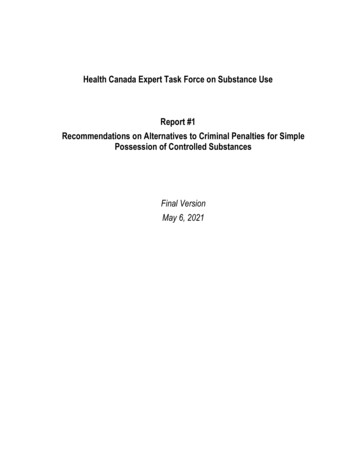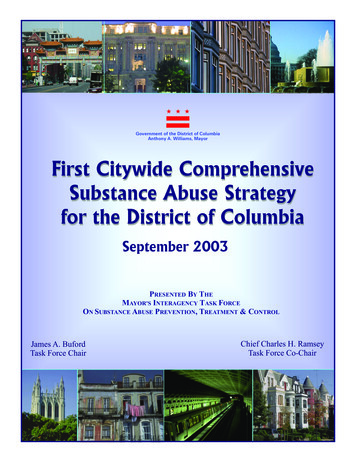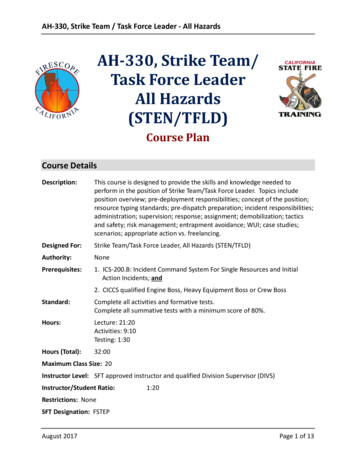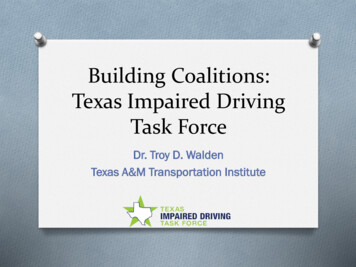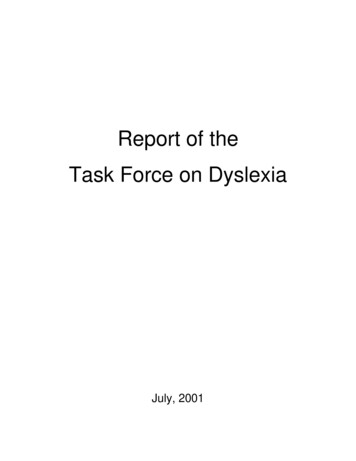
Transcription
Report of theTask Force on DyslexiaJuly, 2001
TABLE OF CONTENTSForewordviAcknowledgementsviiMembership of the Task ForceixExecutive SummaryxiA Summary of Recommendations of ParticularInterest to Parentsxvii1The Context of the Task Force’s Work11.1Introduction11.2Principles Guiding the Work of the Task Force31.3Legal Contexts41.4Policy Contexts51.5Organisation of the Report62Submissions to the Task Force82.1Introduction82.2Summary of Submissions92.3Conclusion13ii
3National and International Perspectives onDyslexia143.1Introduction143.2Dyslexia: An Irish Perspective153.3Dyslexia in Other Educational Systems173.4Criticisms of Definitions and Identification Criteria233.5Information Processing and Dyslexia263.6Dyslexia and Its Main Characteristics284Review of Current Provision and Services forStudents with Learning Difficulties Arising fromDyslexia294.1Introduction294.2Provision of Support by Class Teachers and LearningSupport Teachers (Primary Level)294.3Provision of Special Education Services (PrimaryLevel)334.4Provision of Support by Subject, Learning-Support andResource Teachers (Post-Primary Level)394.5Provision of Reasonable Accommodation in StateExaminations424.6Exemption from the Study of Irish (Gaeilge)474.7Provision of Other Intervention Programmes484.8Provision of Psychological Services494.9Preservice Teacher Education and In-careerProfessional Development514.10Provision of Alternative Therapies554.11Provision of Services by Voluntary and StatutoryOrganisations Outside the School System56iii
5Identifying Learning Difficulties Arising fromDyslexia575.1Introduction575.2A Phased Process of Assessment585.3Matching Level of Support to Learning Needs725.4Record Keeping745.5Development of Assessment Instruments755.6Identification of Individuals with Dyslexia Outside theSchool System766Implementing School and System-Level Provision776.1Introduction776.2Linking Provision to Developmental Needs776.3Planning and Implementing a Whole School Approach806.4Developing, Implementing and Reviewing IndividualLearning Programmes846.5Providing an Effective Response to Dyslexia in theClassroom856.6Providing Effective Reading Instruction876.7Using Information and Communication Technologies(ICTs)886.8Promoting Parental Involvement916.9Raising Awareness about Dyslexia926.10Establishment of an Appeals Procedure936.11Designing In-career Development for Teachers936.12Monitoring Quality and Evaluating ProgrammeEffectiveness946.13Co-ordinating National Resources95iv
ons – System Level987.3Recommendations – Preservice Teacher Education1037.4Recommendations – In-career ProfessionalDevelopment of Teachers1047.5Recommendations – School/Local Level1057.6Recommendations – Class Level1067.7Recommendations – Other Service Providers107Appendices109ATerms of Reference/Cúram an Ghrúpa Oibre110BIndicators of Learning Difficulties, Including ThoseRelated to Dyslexia112CSchedule of Task Force’s Meetings116DDepartment of Education and Science Programmesfor Schools in Designated Areas of EducationalDisadvantage117EProvision by the Department of Education andScience for Traveller Children119FThe Public Consultation Process120GLists of Individuals, Educational Institutions andOrganisations Making Submissions to the TaskForce121HThree Case Histories132Glossary134v
FOREWORDFrom the commencement of my term of office as Minister, I have stated myconcern for those students with learning difficulties and for those with specialeducational needs. Our educational system works well for most students butthere are some who need extra help. In particular, I want to address the needsof students with dyslexia as a matter of urgency. I am extremely pleased to havehad the advice of a Task Force on this matter. I note that the Task Force hasconsulted broadly, both in Ireland, through the acceptance of written and oralsubmissions, and abroad. I note in particular the sense of frustration anddesperation conveyed in many of the submissions, and this has heightened myresolve to address dyslexia as a matter of urgency.I particularly value the links with Northern Ireland and Britain, which highlight theextent to which educators in these islands face common challenges. I also valuethe co-operation between my Department and the U.S. Department of Education,which resulted in the expertise of the U.S. Office of Special Education Programsbeing made available to the Task Force.Late last year, I announced a 2 million initiative involving the delivery of laptopcomputers to students with dyslexia and other reading and writing problems in 31post-primary schools. The project will explore ways in which Information andCommunication Technologies (ICTs) can assist students with learning difficultiesto work independently within mainstream classes, and provide flexibility in thetime and place of learning. I am confident that this initiative will complement thework of the Task Force by adding to our knowledge of what works on the groundin schools.I congratulate the Task Force, and its chair, Peadar Cremin, for completing awide-ranging report in a short period of time. This report of the Task Force will beof great assistance to me in taking further action to assist young people withdyslexia, within the broader context of meeting the needs of all students withlearning difficulties and disabilities. I note that learning difficulties arising fromdyslexia can range in severity from mild to severe, and it is my intention to matchthis continuum of severity with a continuum of provision that will be flexible andresponsive to the needs of parents, teachers and students alike.Michael Woods, T.D.Minister for Education and Sciencevi
ACKNOWLEDGEMENTSIn the first place, I personally acknowledge the dedication and commitment of themembers of the Task Force for the positive approach that they, individually andin Working Groups, brought to our work. The members of the Task Forcededicated large amounts of personal time to the challenge of delivering a reportwithin a tight deadline, engaging in extensive research and drafting. Somebrought expertise gleaned from many years of research and practice while othersprovided valuable links to various bodies and groups that address similarchallenges in other jurisdictions.I also acknowledge the contribution of the many individuals, organisations andbodies who took the time to prepare the submissions that have guided the workand the recommendations of the Task Force. In addition to 896 oral submissions,which were recorded on the Task Force's open telephone line, 399 writtensubmissions were received. Many individual testimonies were received fromadults who had to meet the challenge of dyslexia when it was less wellunderstood than it is today. Other submissions were received from parents orguardians, many of whom were unclear as to the supports that they might avail ofin meeting the needs of their children. Many identified gaps in the professionalknowledge of those whom they approached for support. Teachers and othersinvolved in the provision of services to children and adults with learningdifficulties also made submissions, as did third-level institutions andorganisations that support students with disabilities in higher education. TheTask Force has given careful consideration to all.The Task Force was fortunate in having the opportunity to meet with a delegationfrom the United States of America comprising of Dr. David P. Hallahan,University of Virginia, and Dr. Philip Strain, of the University of Colorado, expertsin the field of special education, and Ms. Patty Guard, the most senior permanentofficial in the U.S. Department of Education’s Special Education section. I ammost grateful to Dr. Hallahan for his presentation on ‘Learning Disabilities: TheU.S. Experience’, and to all the members of the delegation for their valuableinsights.I acknowledge the contributions of the Northern Ireland representatives on thejoint North-South Special Education Co-ordination Group, who attended thepresentation by Dr. Hallahan, and participated in the discussions afterwards. Ms.Marleen Collins, Education and Training Inspector, Department of Education,Northern Ireland, a member of the North-South Group and the Northern Irelandrepresentative on the Task Force, willingly shared with us her experiences of theNorthern Ireland Inter-Board Dyslexia Group – a group set up in Northern Irelandto co-ordinate policy on dyslexia across Library Boards. Her insights addedsignificantly to our perceptions of the problems and possible solutions associatedwith the needs of students with dyslexia – North and South.viivii
The Task Force was also fortunate to have the expertise of Dr. Rea Reason ofthe University of Manchester available to it throughout its deliberations. Dr.Reason willingly shared her expertise, gleaned from her academic work, herexperiences as a psychologist in Oldham, and her recent involvement inpreparing a publication on the assessment of dyslexia on behalf of the BritishPsychological Society.I thank Dr. Michael Woods, T.D., Minister for Education and Science, for havinghad the perspicacity to establish this Task Force and I trust that therecommendations presented will help him in meeting his wishes to have theindividual needs of students with dyslexia addressed. I am especially grateful toJohn Dennehy, Secretary General of the Department of Education and Science,to Liam Kilroy, Principal Officer, Special Education Section, to Martin Shiel,Executive Officer, Special Education Section, for their ongoing support to thework of the Task Force.Special thanks are due to Dr. Thomas Kellaghan, Educational Research Centre,and to Dr. Eugene Wall, Mary Immaculate College, Limerick, who reviewed andcommented on an earlier draft of the report.Thanks are also due to Gerry Shiel, a member of the Task Force, who skilfullysynthesised draft chapters and sections prepared by Working Groups of the TaskForce, and integrated them into the final report.Ba mhaith liom focail bhuíochais ar leith a ghabháil leo siúd a dhírigh ár n-aire archainteoirí na Gaeilge agus na deacrachtaí ar leith atá ag páistí sna Gaeltachtaíó thaobh discléicse de. Tá súil agam go gcabhróidh na moltaí iniata lena gcássiúd.Finally, I owe a particular debt of gratitude to Eamonn McGuinness, who, assecretary to the Task Force, took on a diversity of onerous tasks and completedthem with good humour and patience, professionalism and efficiency.Peadar CreminChairpersonviiiviii
MEMBERSHIP OF TASK FORCEDr. Peadar Cremin, (Chairperson), President, Mary Immaculate College ofEducation, LimerickMr. Eamonn Mc Guinness, (Secretary), Retired Inspector, Department ofEducation and ScienceMs. Marleen Collins, Education & Training Inspectorate, Department ofEducation, Northern IrelandMr. Brendan Culligan, Teacher, Bayside Senior National School, Sutton, DublinMs. Críona Garvey, Senior Psychologist, National Disability Authority andNational Educational Psychological ServiceMs. Pauline Geatons, Neuro-Developmental Therapist, Sutton, DublinMs. Monica Healy, Raheny, DublinBr. Luke Macnamara, Teacher, Glenstal Abbey School, Murroe, Co. LimerickMr. Don Mahon, Inspector, Department of Education & ScienceDr. Donal Mc Ananey, Director of Research and Development, REHAB GroupMr. Páid Mc Gee, Director of Special Education, St. Patrick’s College,Drumcondra, DublinMs. Thérèse Mc Phillips, Principal, St. Oliver Plunkett National School,Monkstown, Co. Dublin.Mr. Michael Murphy, Principal, St. Thomas’ Senior National School, Jobstown,Tallaght, DublinDr. Rea Reason, School of Education, The University of Manchester,Manchester, EnglandMr. H. Alan Sayles, Learning Support Teacher, Mount Temple School, MalahideRoad, DublinDr. Gerry Shiel, Research Fellow, Educational Research Centre, St. Patrick’sCollege, Drumcondra, DublinMs. Joan Walshe, Senior Psychologist, National Educational PsychologicalService Agencyix
Note to Printers: (include photograph)x
EXECUTIVE SUMMARYRecent national and international studies of reading literacy point to widevariation in achievement among Irish students. The 1998 National Assessment ofReading Achievement estimated that 1 in 10 students in fifth class in primaryschools had serious literacy difficulties. Based on the outcomes of an earlierinternational study, it was estimated that between 6½ and 8½% of Irish 14-yearolds had literacy difficulties that were likely to impede their educationaldevelopment and their life chances. The consequences of low literacy levels atthe individual and societal levels are well documented, and are a matter of greatconcern, both within and outside of educational system.Difficulties in reading, spelling and writing are associated with a range of factors.These include intra-individual factors, such as information processing skills andattention, and environmental factors, such as socioeconomic status, level ofsupport for learning in the home, quality of teaching and quality of the learningenvironment at school. These factors interact in complex ways during learning.Intra-individual learning difficulties that are specific to a particular area offunctioning are often called specific learning difficulties.1 Where such difficultiesare specific to reading, spelling and/or writing, they may be referred to asdyslexia. In cases where learning difficulties arising from dyslexia are particularlysevere, they may warrant special educational provision.A Task Force on Dyslexia was appointed by the Minister for Education andScience to review the current range of educational provision and supportservices available to children with specific reading disabilities in Ireland, toassess the adequacy of current educational provision and support services andto make recommendations for the development or adjustment of existing policyapproaches, educational provision and support services. The Task Force wasalso invited to make recommendations on related matters.The Task Force sought written submissions and received responses from 399individuals, educational institutions and organisations. Parents, in particular,shared their views and frustrations with the Task Force. In addition to the writtensubmissions, 896 oral submissions were received from individuals by telephone.The Task Force took these submissions into account in reviewing provision, andin formulating recommendations. The Task Force also looked at provision forstudents with specific learning difficulties including those arising from dyslexia inother educational systems in the course of its work.1The terms ‘specific learning difficulty’ and ‘specific learning disability’ both appear in theliterature on reading difficulties, and in policy statements issued by educational systems. In theUnited States and Ireland, for example, ‘specific learning disability’ is widely used, whereas, inBritain and Northern Ireland, ‘specific learning difficulty’ is preferred. Both terms include dyslexia.xi
What is Dyslexia?Educational systems often define dyslexia as a specific learning difficultyaffecting reading, spelling or writing. In Ireland, the Report of the SpecialEducation Review Committee2 (1993) indicated a preference for the term‘specific learning disability’ over ‘dyslexia’ and defined such disability as‘impairment in specific aspects of reading, writing and arithmetical notation, theprimary cause of which is not attributable to assessed ability being below theaverage range, to defective sight or hearing, emotional factors, a physicalcondition, or to any extrinsic adverse circumstances’.The Task Force proposes a somewhat broader conceptualisation of dyslexia thatrecognises the continuum of learning difficulties arising from dyslexia thatstudents may experience, while also taking into account recent research findingson the aetiology of dyslexia:Dyslexia is manifested in a continuum of specific learning difficultiesrelated to the acquisition of basic skills in reading, spelling and/or writing,such difficulties being unexpected in relation to an individual’s otherabilities and educational experiences. Dyslexia can be described at theneurological, cognitive and behavioural levels. It is typically characterisedby inefficient information processing, including difficulties in phonologicalprocessing, working memory, rapid naming and automaticity of basicskills. Difficulties in organisation, sequencing, and motor skills may also bepresent.Typically, educational systems set out criteria to identify dyslexia, and todetermine if special educational provision is needed. In Ireland, as in othercountries, two main criteria are currently considered: whether achievement, asmeasured by a standardised, norm-referenced test, is low, and whether generalability (usually full-scale IQ), which is assumed to reflect an individual’s learningpotential, is in the average range or higher. Although criticisms have beenlevelled at the use of full-scale IQ as a measure of ‘potential’, few alternativemeasures are currently available, and none is in widespread use. With regard toachievement, some systems (including the Irish system) set specific cut-offpoints such as the 2nd percentile. A number of systems also require a ‘significant’discrepancy (difference) between an individual’s ability (full-scale IQ) andachievement scores. Such approaches have been strongly criticised, often on thegrounds that they exclude certain groups of students from accessing services,including students whose achievement or ability scores fall outside specified cutoff points. Regardless of which criteria are used, it seems important that eachstudent with learning difficulties arising from dyslexia receives a level of provisionappropriate to his/her needs.2Special Education Review Committee. (1993). Report (p. 86). Dublin: Stationery Office.xii
Review of Current Range of Provision and ServicesIn its review of current provision, the Task Force adopted the view that thelearning difficulties of students with dyslexia, which range along a continuumfrom mild to severe, should be matched by a range of appropriate provision andservices.The Task Force noted that a range of provision and services is currentlyavailable to students with learning difficulties arising from dyslexia, including: additional support from class and subject teachers;supplementary teaching from a learning support (remedial) teacher; andspecial education provision.Special education provision may involve resource teaching (i.e., the provision ofsupplementary teaching in the student’s own school on a daily basis by aresource teacher), enrolment in a special class for students with specific learningdisabilities in a mainstream school, or enrolment in a special school for studentswith specific learning disabilities. Learning support and resource teachingservices have increased in size and scope in recent years, while additionalspecial classes in primary schools have also been established. However, anumber of difficulties arise in considering the effectiveness of these provisions: no information is available on the numbers of students with dyslexia whoare in receipt of learning support or resource teaching;information on the effects of learning support and special educationprovision, including information on how students fare if special provision hasbeen discontinued, is limited;no information is available on the relative effects of different forms of specialeducation provision, such as resource teaching, in a student’s own schoolor enrolment in a special class or school;no review of the operation or effectiveness of the learning support service insecond-level schools had been undertaken.On the basis of submissions to the Task Force, however, it can be inferred thatthe system of provision for students with learning difficulties arising from dyslexiais not functioning at optimal level. Many submissions referred to difficulty inaccessing psychological assessments in order to access services, to themisunderstandings about dyslexia held by some class and subject teachers, andto a failure by schools and teachers to identify students’ difficulties at an earlystage so that early intervention could be provided. Many parents indicated thatthey had gone to great expense to pay for assessments, tutoring services, andtherapies designed to alleviate the effects of learning difficulties arising fromdyslexia, and argued that the state should provide appropriate services withoutadditional cost to parents in terms of time and money. Finally, several parentsxiii
commented that they had great difficulty in accessing information about dyslexiaand about the provision and services that are available to students with dyslexia.The Task Force also considered the range of accommodations that are availableto students with dyslexia in state examinations, and the effects of changesimplemented by the Department of Education and Science over the past year orso, following the publication of a report by an Expert Advisory Group onCertificate Examinations. Of particular concern to persons making submissionsto the Task Force was the recently introduced practice of appending explanatorynotes to the certificates of students who obtained certain accommodations suchas the services of a reader, or access to a tape recorder or word processor. Stillothers argued that appropriate training in the use of technologies such as taperecorders and word processors should be provided well in advance of theexaminations. Others worried that their children’s scripts might not receiveadequate attention from examiners who are unfamiliar with the difficulties ofstudents with dyslexia.Rationale Underpinning the Approach of the Task ForceThe Task Force was concerned with the extent to which students with dyslexiaare ‘categorised’ in order to access a level of support appropriate to their needs.The Task Force favours an approach in which the principle of each child having aright to an education appropriate to his or her individual needs (the‘individualised’ model) would apply. This section presents a rationale for theapproach of the Task Force, which led to the recommendations presented in thisreport.The Task Force considered that the individual manifestations of dyslexia are sodiverse and the range of need so varied that learning difficulties arising fromdyslexia should be viewed along a continuum rather than falling into clearlydefinable categories. The Task Force recommends the adoption of a modelof provision based on meeting the needs of each student along thecontinuum of learning difficulties arising from dyslexia. The Task Forcedoes not feel that it is appropriate to categorise students as the basis forprovision. The model which the Task Force proposes is based on the principle ofdifferentiated response, and has a dual purpose. In the first instance, it seeks toidentify and support students as early as possible to alleviate potential difficultieslater. Secondly, it seeks to provide the most intensive support to those studentswhose learning difficulties arising from dyslexia are the most severe.The members of the Task Force were anxious to ensure that, in so far as ispossible, the needs of students with learning difficulties arising from dyslexiashould be met in their own schools. In the first instance, instructional strategiesshould be adjusted by the student’s class teacher. For some students, progressto a period of intensive learning support teaching will be required. The TaskForce broadly endorses the approach to intervention outlined in the Learningxiv
Support Guidelines,3 which provides for assessment and programme planning atthe individual student level and involves class teachers, learning supportteachers and parents working collaboratively to identify and meet agreed learningtargets. Should a student with learning difficulties arising from dyslexia notrespond to provision in his/her own classroom, or in a learning support settingafter a reasonable period of time, the Task Force proposes a multi-disciplinaryreview of the child’s learning needs, in which the nature and severity of thechild’s learning difficulties are examined, and the most appropriate form ofprovision is identified. Such provision may be within the child’s own school, or,where this is not possible, because of the need for very specialised support, inanother school in the child’s community.The Task Force considered the criteria currently used to identify students withspecial needs in order to access special educational resources to be problematic.For one thing, some students are not adequately provided for because they fallmarginally outside current eligibility thresholds. Other children may be excludedbecause of difficulty in accessing the form of assessment required by currentcriteria. The Task Force, while recognising the limitations of intelligence tests asmeasures of potential, notes the central role afforded to such tests in currentnational and international definitions of dyslexia. In its view, the outcome of suchtests is but one of several factors that should be taken into account in reachingdecisions about a student’s learning needs. Alternatives to current measures ofability and learning potential should be carefully examined, if and when they aredeveloped.The Task Force considers individualisation of provision to be an educationalimperative and a legal requirement. It considers that there is a need for furtherdebate and ongoing research to advance our thinking on how, in the context ofthe Irish educational system, the goal of individualisation can be achieved.The Task Force notes that difficulties may arise in implementing theindividualised model. However, it is firmly of the view that it is essential to moveas quickly as possible towards implementing such a model.The change to an individualised system has implications for those charged withdelivery within that system and for the availability of resources. For all studentswith learning difficulties arising from dyslexia, the need for individualised supportat the class level in primary schools and at subject level in post-primary schoolswill be increased. As classroom teachers exercise a key role in addressing andmeeting needs, enhanced levels of teacher preparation and of in-careerdevelopment and training will be required. The recommendations of the TaskForce seek to ensure that both the financial and human resources required for anindividualised approach will be put in place to maximise the capacity of thesystem to meet the needs of students equally throughout the state.3Department of Education and Science. (2000). Learning Support Guidelines. Dublin: StationeryOffice.xv
Organisation of RecommendationsIn arriving at recommendations for the future development of provision andservices for students with dyslexia, the Task Force was aware of plans by theDepartment of Education and Science to implement some urgently requiredinitiatives in the near future, including the establishment of a National SupportService for Special Education and the provision of inservice training for principalteachers and learning support teachers on the new Learning Support Guidelines.These and related developments, including ongoing reviews of preserviceteacher education at the primary and post-primary levels and the plannedexpansion of the National Educational Psychological Service (NEPS), haveimplications for meeting the needs of all students with learning difficulties,including students whose difficulties arise from dyslexia. In arriving at its ownrecommendations, the Task Force adopted the perspective that a package ofinitiatives would need to be implemented if the situation of students with learningdifficulties arising from dyslexia is to be improved significantly.The recommendations of the Task Force may be categorised as referring to: System-level issues;Preservice teacher education;In-career professional development of teachers;School/local-level initiatives;Classroom-level initiatives;Initiatives by other service providers.Implementation of RecommendationsIn putting forward its recommendations, the Task Force made a distinctionbetween those that should be implemented in the short term (i.e., in the 2001-02school year), and those that should be implemented in the medium term (i.e.,within three years). The Task Force recommends that the implementation of itsrecommendations should be reviewed in three years’ time, and that, at that time,account should be taken of emerging findings and new initiatives in the area ofdyslexia.xvi
A SUMMARY OF RECOMMENDATIONS OF PARTICULARINTEREST TO PARENTSThe work of the Task Force was facilitated to a considerable degree by thevolume and relevance of the submissions, oral and written, which it received inresponse to its appeal. The vast majority of these submissions came from you,the parents, who have first-hand experience of the learning difficulties arisingfrom dyslexia that are experienced by your children. We thank you for yourcontributions; we have read your comments carefully and we recognise thecomplex nature of your experiences and your needs. We feel that the followingrecommendations in our report will help to achieve a more appropriate provisionfor the distinct educational needs of children with dyslexia.Professional Development of Teachers Preservice teacher education programmes and in-career developmentcourses for serving teachers should pay special attention to identifying andmeeting the needs of students with learning difficulties arising from dyslexia.[Recommendations 31-38]Psychological Services The number of places for the post-graduate training of educationalpsychologists should be increased. [R54] Educational psychology should be offered as a subject in Colleges ofEducation. [R33] Funding should be provided to schools to enable them to employ approvedcontract psychologists to expedite assessments. [R55] The National Educational Psychological Service (N
and to Dr. Eugene Wall, Mary Immaculate College, Limerick, who reviewed and commented on an earlier draft of the report. Thanks a re also due to Gerry Shiel, a member of the Task Force, who skilfully synthesised draft chapters and sections prepared by Working Groups of the Task Force, and integrated them into the final report.



